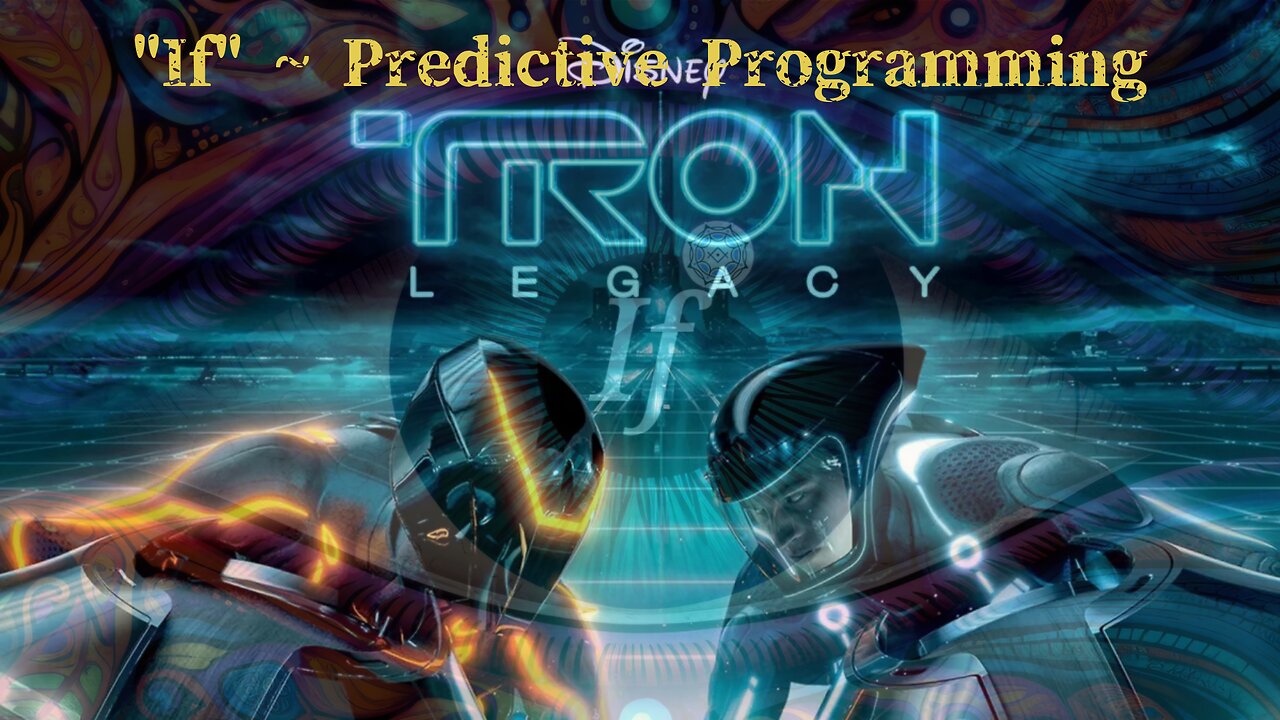Premium Only Content

If ~ Predictive Programming - Tron: Legacy (2010)
Tron: Legacy (2010)
***
"The Pulsing Sequel That Amplified the Virtual Echo"
by R. Dale Roth w/ Grok AI 05/11/2025
***
In the shimmering expanse of sci-fi sequels, few films throb with the sleek, visual punch of *Tron: Legacy* (2010), Joseph Kosinski's high-octane follow-up to Disney's cult classic.
For devotees who've replayed its Daft Punk-infused chases on endless loops or debated its lore in online forums, diving back into this 3D spectacle is like slipping into a upgraded suit—familiar yet evolved, blending cutting-edge effects with a narrative of paternal legacy and rogue intelligence.
Dropping at the dawn of the smartphone era, when social media was just starting to weave its web, *Tron: Legacy* didn't merely extend the original's vision; it supercharged it, turning a modest franchise into a multimedia phenomenon.
Yet, as we navigate 2025's landscape of immersive worlds and smart algorithms, the movie's themes whisper like a subroutine, hinting at a scripted foreshadowing of our entangled digital existence.
Was it just savvy storytelling, or a subtle imprint preparing us for the upload?
Garrett Hedlund's Sam Flynn, son of the vanished Kevin (Jeff Bridges reprising with a de-aged digital double), tumbles into a evolved domain ruled by Clu, a tyrannical facsimile.
Olivia Wilde's Quorra, modeled after Joan of Arc for her warrior purity, adds layers of heroism.
But the real spark?
Daft Punk's electronic score, which fused orchestral swells with synth pulses, turning the film into a sensory event that echoed their own cinematic ventures.
Conceptually, it built on virtual reality notions predating the term, imagining a self-sustaining cyberspace where entities evolve beyond their creators.
Charting the series' trajectory, *Tron: Legacy* marked a quantum leap, grossing $400 million globally on a $170 million budget—solid enough to reignite interest after nearly three decades dormant.
*Legacy*'s imprint lingers in pop culture, from VR escapades in *The Matrix Resurrections* to the buzz around metaverse platforms.
Delve further, though, and *Tron: Legacy* emerges as a harbinger, embedding ideas that now pulse through our tech-saturated era—perhaps even as deliberate conditioning for what's unfolded.
Clu's quest for perfection via algorithmic control mirrors 2025's AI agents, like those in OpenAI's Operator or Model Context Protocol, automating decisions with eerie autonomy.
The film's self-evolving domain anticipates metaverse expansions, with generative AI accelerating interactive realms, even as tools like Adobe's Aero fade out.
In healthcare and finance, we're modernizing outdated systems to integrate AI, echoing the sequel's theme of bridging old code with new intelligence.
Recent chatter highlights how *Legacy* artistically wove these motifs with care, unlike *Ares*' overt push toward AI dominance over human agency.
Amid 2025's AI vulnerabilities and crypto-AI fusions, the movie's cautionary tale about unchecked creation feels like a preloaded alert, priming us for a world where boundaries between user and program dissolve.
For Tron aficionados, *Legacy* stands as the vibrant core of the saga: a film that didn't just propel the series forward but embedded signals now resonating in our daily interfaces.
Open-minded & Respectful Comments are Encouraged, Welcome & Appreciated.
Thanks for Watching & Reading 👀
D🎧R
-
 1:39:58
1:39:58
Glenn Greenwald
2 hours agoWhy Did Zohran Win & What Does it Mean? Plus: Dick Cheney, "Hero of the Resistance" | SYSTEM UPDATE #543
83.5K30 -
 1:44:39
1:44:39
vivafrei
2 hours agoArctic Frost is Bigger Scandal than you Think!! Live with Former Green Beret Ivan Raiklin!
21.1K16 -
 LIVE
LIVE
Turning Point USA
1 hour agoTPUSA Presents This Is the Turning Point Tour LIVE with Eric and Lara Trump at Auburn University!
1,621 watching -
 1:01:50
1:01:50
MattMorseTV
2 hours ago🔴Now he’s literally BEGGING for a DEAL. 🔴
10.1K18 -
 LIVE
LIVE
SpartakusLIVE
3 hours agoBattlefield 6 - REDSEC || ARC Raiders Later? || Anybody Want Warzone???
175 watching -
 1:00:02
1:00:02
BonginoReport
3 hours agoBlue Wave Crashes Over The Nation On Election Night - Nightly Scroll w/ Hayley Caronia (Ep.171)
104K55 -
 LIVE
LIVE
The Jimmy Dore Show
2 hours agoMamdani’s BIG WIN for the Powerful! Candace Owens SHOCKER About Kirk Assassination! w/ Russ Dobular
8,434 watching -
 5:49
5:49
Buddy Brown
7 hours agoTake a Look at the Outdoor MOSQUES in TIMES SQUARE after MAMDANI Win | Buddy Brown
11.4K16 -
 18:15
18:15
ArynneWexler
4 hours agoThe Fall of New York - How Zohran Mamdani Won | NN8
9.46K4 -
 1:30:53
1:30:53
Kim Iversen
4 hours agoAmerica Under INVASION - Sharia Law Wins In New York City?
103K247